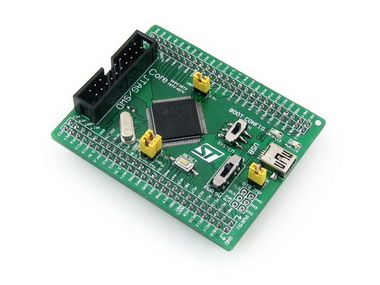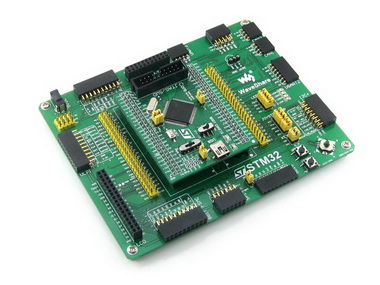Details

Overview
Core103V is a small STM32 development board that features an STM32F103VET6 device as the microcontroller, supports further expansion. It is ideal for starting application development with STM32F family.
As a minimal ready-to-run system, the Core103V integrates USB communication interface, JTAG/SWD programming/debugging interface, clock circuit, boot mode selection, and so on.
Furthermore, pin headers on the backside allow the Core103V to be plugged-in your application board and act as the MCU core circuit in your system. All the I/O ports are accessible on the pin headers, and the header pitch is designed as 2.54mm.
What's On Board
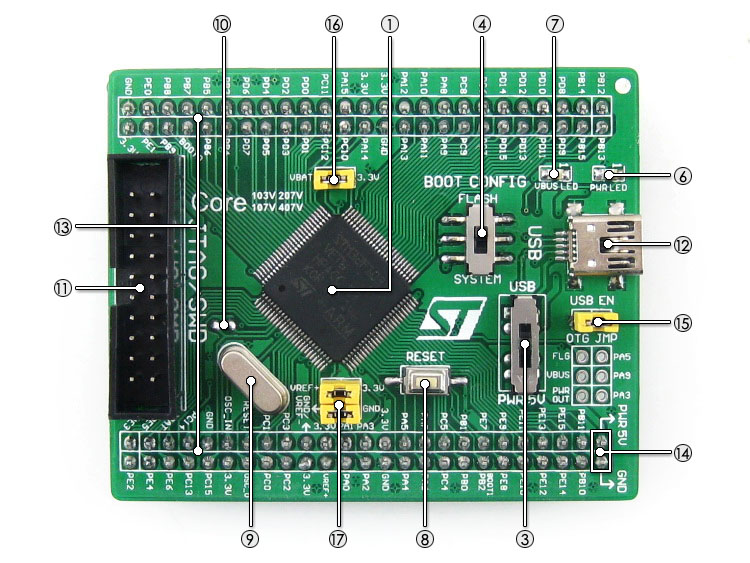
- STM32F103VET6:the high performance STM32 MCU which features:
- Core: Cortex-M3 32-bit RISC
- Operating Frequency: 72MHz, 1.25 DMIPS/MHz
- Operating Voltage: 2-3.6V
- Package: LQFP100
- I/Os: 80
- Memories: 512kB Flash, 64kB RAM
- MCU communication Interfaces:
- 3 x SPI, 5 x USART, 2 x I2S, 2 x I2C, 1 x FSMC, 1 x LCD, 1 x SDIO, 1 x USB, 1 x CAN
- AD & DA converters: 3 x AD (12-bit, 1μs, shares 16 channels); 2 x DA (12-bit)
- Debugging/Programming: supports JTAG/SWD (serial wire debug) interfaces, supports IAP
- AMS1117-3.3 (on bottom side): 3.3V voltage regulator
- Power supply switch, powered from 5Vin or USB connection
- Boot mode selection, for configuring BOOT0 pin
- Boot mode selection (on bottom side), for configuring BOOT1 pin
- Power indicator
- VBUS LED
- Reset button
- 8M crystal oscillator
- 32.768K crystal (on bottom side), for internal RTC with calibration
- JTAG/SWD interface: for debugging/programming
- USB connector, used for establishing USB communication between PC and the STM32 development board
- IO expander (including VCC/GND), all the I/O pins are accessible on expansion connectors for further expansion
- 5Vin pinheader, 5V power supply input
- USB enable jumper
- short the jumper to enable USB function
- open the jumper to disable, as well as taking up no I/O port
- VBAT selection jumper
- short the jumper to use system power supply
- open the jumper to connect the VBAT to external power, such as battery
- VREF selection jumper
- short the jumper to connect VREF+/VREF- to VCC/GND
- open the jumper to connect VREF+/VREF- to other custom pin via jumper wire
Photos
Note:
Core103V provides JTAG/SWD debugging interface, yet does NOT integrate any debugging function, a debugger is required.
Mother board and programmer/debugger in the photos are NOT included in the price.
JTAG/SWD Interfaces
The figure 1, figure 2 shows the header pinout of JTAG, SWD interface respectively
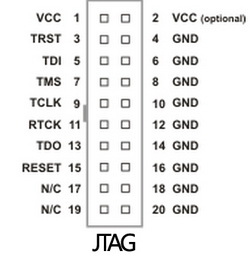
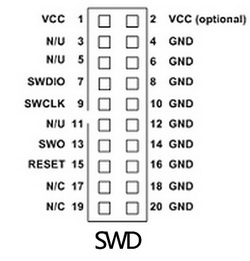
Development Resources
- Related software (KEIL etc.)
- Examples in C
- Schematic (PDF)
- Development documentations
Wiki: www.waveshare.com/wiki/Core103V
Dimensions


